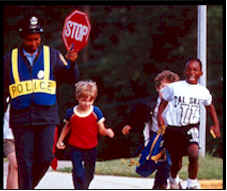|
|
|

March
5, 2002 - Volume 8,
Issue 4
|
|
| Hill
Update |
Congressional Support Grows for Increased
Highway Funding
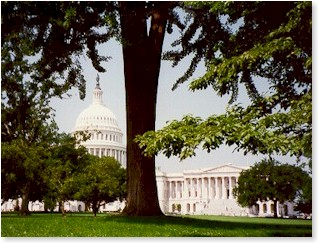 Support continues to expand for
legislation that would add $4.4 billion to the highway
portion of the FY '03 transportation spending bill.
Cosponsorship of H.R. 3694 has reached 265 House members
and 48 Senators have signed onto companion bill S. 1917.
Bush's $59.3 billion DOT budget proposes setting Federal
Highway Administration obligation limits to the states
at $23.2 billion -- a level that is 16% below the
baseline established in TEA-21 and 27% below this year's
spending levels. Federal Highway Administrator Mary
Peters told members of the Environment and Public Works
Committee her office is willing to work with members on
their bill to restore some of the money. She also said,
however, that there is still time to explore options to
soften the blow of any remaining cut, such as working
with states on advanced construction and financing to
better leverage the money that's in the highway trust
fund now. Support continues to expand for
legislation that would add $4.4 billion to the highway
portion of the FY '03 transportation spending bill.
Cosponsorship of H.R. 3694 has reached 265 House members
and 48 Senators have signed onto companion bill S. 1917.
Bush's $59.3 billion DOT budget proposes setting Federal
Highway Administration obligation limits to the states
at $23.2 billion -- a level that is 16% below the
baseline established in TEA-21 and 27% below this year's
spending levels. Federal Highway Administrator Mary
Peters told members of the Environment and Public Works
Committee her office is willing to work with members on
their bill to restore some of the money. She also said,
however, that there is still time to explore options to
soften the blow of any remaining cut, such as working
with states on advanced construction and financing to
better leverage the money that's in the highway trust
fund now.
Congressional TEA-21
Reauthorization Schedule
Duane Gibson, staff member to the
House Transportation and Infrastructure Subcommittee on
Highways and Transit (the panel overseeing TEA-21
renewal), outlined the likely House schedule for action
on legislation renewing TEA-21 during remarks last week
before the American Association of State Highway and
Transportation Officials (AASHTO). He indicated that the
subcommittee would introduce legislation in February
2003 and would act on that legislation in March of that
year. The full Transportation and Infrastructure
Committee would act before Memorial Day 2003, and the
bill would go to the full House after the Memorial Day
recess.
The Senate has not announced their
reauthorization schedule, but fully expects to renew the
bill next year
|
| London Instituting "Congestion
Charge" |
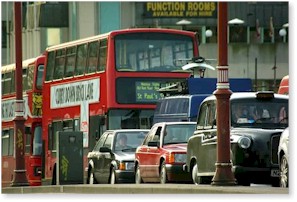 Beginning February 2003,
London drivers will face a daily charge of about $7 a
day should they choose to drive into the heart of the
city. According to the Washington Post, the charge "will
be levied on cars and trucks entering the
eight-square-mile central zone between 7 a.m. and 6:30
p.m. Monday through Friday." The system will be enforced
by hundreds of closed-circuit cameras which will check
license plate numbers of cars entering the central zone
against a database of commuters who have paid the daily
fee. London Mayor Ken Livingstone announced the charges
last week as the centerpiece of a plan to reduce traffic
and congestion in London's busy downtown area. According
to Livingstone, the charges would go to fund and
revitalize London's extensive but run-down transit
system. "We're going to dedicate the fees paid and the
fines we get strictly to improving public transit. We're
going to buy 40 percent more buses over the next decade.
This is going to be a boon for most people." Beginning February 2003,
London drivers will face a daily charge of about $7 a
day should they choose to drive into the heart of the
city. According to the Washington Post, the charge "will
be levied on cars and trucks entering the
eight-square-mile central zone between 7 a.m. and 6:30
p.m. Monday through Friday." The system will be enforced
by hundreds of closed-circuit cameras which will check
license plate numbers of cars entering the central zone
against a database of commuters who have paid the daily
fee. London Mayor Ken Livingstone announced the charges
last week as the centerpiece of a plan to reduce traffic
and congestion in London's busy downtown area. According
to Livingstone, the charges would go to fund and
revitalize London's extensive but run-down transit
system. "We're going to dedicate the fees paid and the
fines we get strictly to improving public transit. We're
going to buy 40 percent more buses over the next decade.
This is going to be a boon for most people."
Similar plans are in place in
several cities around the world, including Singapore and
Trondheim, Norway. Despite strong initial resistance to
the plans, the driving fees now have strong support in
the communities in which they have been introduced due
in large part to the reduction in commuting time and
congestion. Stateside, a $1 a day commuter parking tax
proposal was recently shelved in Washington DC because
local officials believed that the tax would be unfair to
commuters who do not have access to public
transportation. Additionally, many elected officials,
especially in Northern Virginia, were reluctant to
support a new tax in an election year. The DC plan would
have brought in an estimated $1 billion for regional
clean-air measures over its first three
years.
For more information, click
here.
|
| Lobbyists Try to Clear the Way for
Segway |
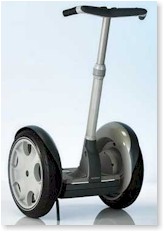 Lobbyists for Segway,
inventor Dean Kamen's two-wheeled, gyroscopic scooter
have been criss-crossing the country in an attempt to
rally legislative support for the new product. The Wall
Street Journal reported March 1 that the Virginia
legislature passed a bill requiring communities to allow
Segway scooters on the sidewalks. A similar bill has
passed both legislative houses in New Mexico, and
legislation authorizing Electronic Personal Assistive
Mobility Devices (EPAMB) has been introduced in all 50
states. Lobbyists for Segway,
inventor Dean Kamen's two-wheeled, gyroscopic scooter
have been criss-crossing the country in an attempt to
rally legislative support for the new product. The Wall
Street Journal reported March 1 that the Virginia
legislature passed a bill requiring communities to allow
Segway scooters on the sidewalks. A similar bill has
passed both legislative houses in New Mexico, and
legislation authorizing Electronic Personal Assistive
Mobility Devices (EPAMB) has been introduced in all 50
states.
Despite the fact that Segway LLC has
made progress in pushing for legislative changes the the
state level, some local officials remain skeptical of
the product's safety around pedestrians and bicyclists.
Acording to Kamen, the scooter, which operates at a top
speed of 12.5 mph, gently stops and rolls backwards when
it encounters an obstacle. Charles Trainor, chief
traffic engineer in Philadelphia, where the Segway would
not be allowed on sidewalks, is unconvinced. If a Segway
"hits a pedestrian, there will be serious damage," says
Trainor. "I would not be in favour of changing the
law."
|
| Dozens of New
Transportation Bills Introduced in
California |
|
Three innovative transportation measures are
up for consideration in the California State
Legislature. Among the mix are Senate Bill 1262, which
directs a portion of state transportation funds to new
incentive programs to help promote infill housing and
transit-oriented development, SB1636, which provides
local governments with more flexibility around so-called
traffic "Level of Service" (LOS) standards in urban
areas that are attempting to build infill development,
and AB2369, which is a bond measure (dollar amount yet
to be determined) to help local governments and public
transit agencies meet the federal requirements of the
American with Disabilities Act (ADA).
For more information on these bills,
visit
http://www.transact.org/Ca/ctrv03n01.htm
|
| Chicago Driver Gets 45
Years for Road Rage Murder of Cyclist
|
|
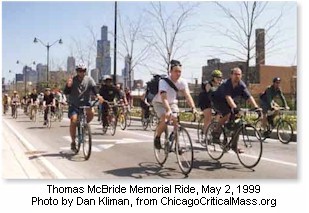 On February 20, Carnell
Fitzpatrick was sentenced to 45 years in prison after
being convicted of first-degree murder for running down
Tom McBride, 26, a bicycle messenger in a fit of road
rage. A Cook County jury on December 4 found Fitzpatrick
guilty of first-degree murder, rejecting convicting him
on a lesser charge of reckless homicide for the April
26, 1999 incident. Prosecutors called the crime the
first local incident of road rage in which a bicyclist
was killed by an angry driver intent on seeking revenge
for a minor traffic dispute. Fitzgerald was accused of
using his 1997 Chevrolet Tahoe to run down McBride after
the cyclist shouted curse words during a near-collision.
The motorist then fled the scene, but later turned
himself in to police, authorities said. On February 20, Carnell
Fitzpatrick was sentenced to 45 years in prison after
being convicted of first-degree murder for running down
Tom McBride, 26, a bicycle messenger in a fit of road
rage. A Cook County jury on December 4 found Fitzpatrick
guilty of first-degree murder, rejecting convicting him
on a lesser charge of reckless homicide for the April
26, 1999 incident. Prosecutors called the crime the
first local incident of road rage in which a bicyclist
was killed by an angry driver intent on seeking revenge
for a minor traffic dispute. Fitzgerald was accused of
using his 1997 Chevrolet Tahoe to run down McBride after
the cyclist shouted curse words during a near-collision.
The motorist then fled the scene, but later turned
himself in to police, authorities said.
-from "BikeLeague News," the League
of American Bicyclists newsletter
For full coverage of the trial from
Chicago Critical Mass, click
here.
| |
|
| |
In
Brief... |
| |
The Surface Transportation
Policy Project has launched a new website, tea3.org. The site will
keep you posted on the hearing schedule, policy issues,
and other developments in the TEA-21 reauthorization
process. The current news item is an analysis of the
Bush budget.
For more info, visit: http://www.tea3.org/.
|
| |
Calendar |
| |
EPA
Public Meetings on the 8-hr Air Quality Standard for
Ground-Level Ozone
March 5,
2002: Alexandria, VA
March 7, 2002: Atlanta,
GA
League
of American Bicyclists Bike Summit
March 6-8,
2002: Washington,
DC
APTA
Legislative Conference
March 10-13: Washington,
DC
AMPO 2002
Washington Policy
Conference:
March 18-20: Washington, DC
National Conference on Aging &
Mobility
March 25-27, 2002:
Scottsdale, AZ
Transportation
and University Communities
Conference
June 15-18, 2002: Amherst,
MA
Senate EPW Transportation
Schedule
March 22:
"Mobility, Congestion,
and
Intermodalisn"
House
Transportation Committee
Schedule
March. 6:
Subcommittee
hearing on Amtrak status
April. 11:
Subcommittee
hearing on passenger rail
Transportation and University
Communities Comference
June 15-18, 2002: Amherst,
MA
|
| |
Quote(s) of the Week |
| |
"Diesel can answer
the needs of society,"
- Nick Scheele,
Chief Operating Officer at Ford Motor Company
"Diesel is toxic to lung functions, and
there are dozens of human studies where diesel is linked
to cancer, and recent research linked diesel to
asthma."
- Dr. Gina Solomon, senior scientist
at the California-based Natural Resources Defense
Council
As quoted in a Washington Post article on Ford's
plans to introduce diesel models of the popular Ford
Focus. To view the article, click
here.
| |
|
Transfer is
written
and
edited by
John
Goldener of the Surface Transportation Policy
Project.
Readers are invited to reprint newsletter items; proper citation is
appreciated. If you are not currently subscribed, please send us a
note via e-mail to: mailto:%20transfer@transact.org.
Be sure to include your full mailing address and name of your
organization, phone and fax numbers. For comments and suggestions
about Transfer's content, contact John Goldener at jgoldener@transact.org.
We
rely on donations to provide Transfer and other services. Please
consider making a donation to STPP via
the secure "Support STPP"
link on our homepage. For more information about
STPP
visit
our web site at http://www.transact.org/
or call 202.466.2636.
|
|
